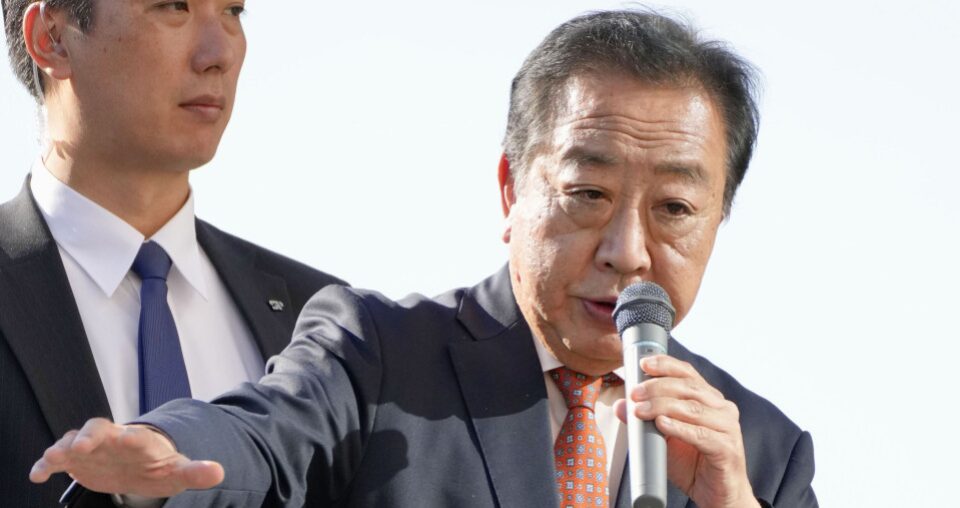Support for the main opposition party, the Constitutional Democratic Party of Japan, and other parties out of power is growing steadily against that of the ruling Liberal Democratic Party ahead of the general election on Oct. 27, a Kyodo News survey showed Sunday.
Although 22.6 percent of respondents said they plan to vote for the LDP in the proportional representation segment of the election, 14.1 percent supported the CDPJ, narrowing the gap between it and the LDP to 8.5 percentage points from 14.0 points in the last survey, results of a nationwide telephone poll conducted Saturday to Sunday showed.

Yoshihiko Noda, head of the main opposition Constitutional Democratic Party of Japan, makes a stump speech in Tokyo on Oct. 20, 2024, ahead of the Oct. 27 general election. (Kyodo) ==Kyodo
The LDP has been struggling to regain public trust in the party in the wake of a slush funds scandal, in which some members failed to properly report income from fundraising parties.
For single-seat constituencies, 33.2 percent said they would vote for opposition-affiliated candidates, exceeding the 24.6 percent for ruling party-affiliated candidates, in a turnaround from the previous survey on Oct. 13.
The approval rating for Japanese Prime Minister Shigeru Ishiba’s Cabinet stood at 41.4 percent while the disapproval rating was 40.4 percent, also narrowing the gap between the two ratings from last week’s poll.
The approval rating according to the previous poll was 42.0 percent and the disapproval rating 36.7 percent.
Asked what their preferred outcome from the election would be, 49.7 percent of respondents said for the ruling and opposition parties to be evenly split, while 20.5 percent said they wanted to see the LDP lose power, up 5.4 points from the previous survey.
When asked whether Ishiba, president of the LDP, or CDPJ leader and former Prime Minister Yoshihiko Noda would be more suitable as the next premier, 47.2 percent said Ishiba, unchanged from the previous survey, while Noda narrowed the gap by 5.2 points with 29.5 percent.
For the survey, 591 randomly selected households with eligible voters and 3,785 mobile phone numbers were called, yielding responses from 508 household members and 754 mobile phone users.
Related coverage:
FOCUS: PM Ishiba’s drastic wage hike push may hurt small firms in Japan
Japan ruling party not assured of majority in upcoming election
FOCUS:Japan’s vital lower house election scrutinizes scandal-hit ruling LDP

